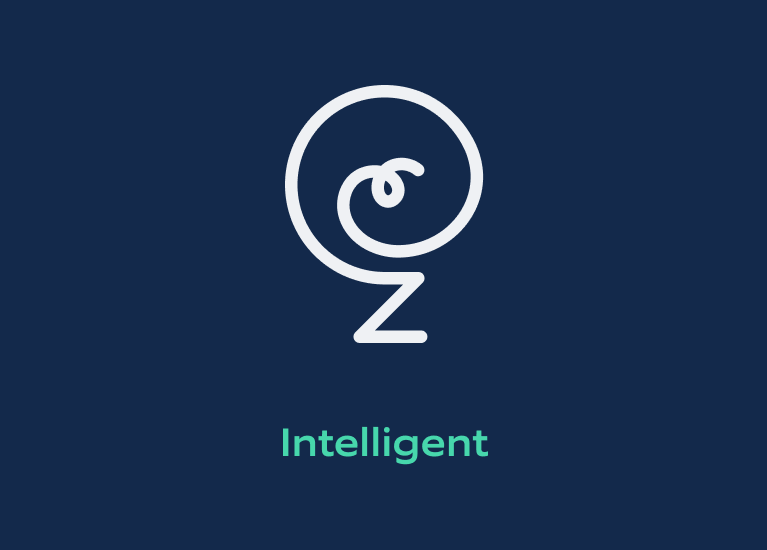CARING - being empathetic, respectful and non-judgmental - is a core value here at Nagarro. At the same time, it’s an acronym for six other core values - Client-centric, Agile, Responsible, Intelligent, Non-hierarchical, and Global - that are part of our org DNA and reflect our unique culture. After interviewing Nagarrians from around the world to understand their perspectives about these values, I created a series of blog posts, with each post focusing on one of our core values. Here’s the fourth blog from the CARING series focusing on ‘I for Intelligent’.
Initially, I felt challenged to find an interview partner for our value “‘Intelligent”, as I’ve never met a Nagarrian boasting about their his/her knowledge. But this topic is not only about knowledge, it’s also about fostering the right mindset. And so I had the pleasure of speaking with Geir Amdal from our office in Norway. He has a freshing point of view, and I was especially intrigued by one of his statements: “We need a lot more incorrect answers.”
Geir enjoys both challenges and changes. Currently, he is Practice Lead for the Atlassian Platform Services team at Nagarro. This interview was somewhat outside of his comfort zone, but he eventually (and thankfully) did make it, with the belief that this would be a new and beneficial experience. His main takeaway was that people should challenge themselves because “learning is more important than knowing.”
If you want to broaden your horizons and, develop your personal skills, and feel inspired, you should read on and take a deep dive into our discussion. Personally, I have learned a lot and gained a deeper understanding of our Nagarro value “Intelligent”.
[Sabrina Floh]: You joined the Nagarro team as the result of a merger. Employees from newly acquired companies often decide to leave after such an event. What influenced your decision to stay?
[Geir Amdal] We were a very small company and our growth strategy was to find a business with whom we could grow together. So, we had three choices: we could try to acquire another company, sell our company, or find a mutually beneficial merger. It was sheer serendipity as Nagarro found us and we found Nagarro. Both the companies were equally aligned in their ideals, goals and views about working culture. As a result, I went from having 30 colleagues to more than 5,000 overnight—how cool is that!
What is the first thing that comes to your mind when you think of the value ‘Intelligent’?
When you asked me to do this interview, my initial thoughts jumped to great mental acuity, a sharp intellect, and the capacity for enormous knowledge. What also came to mind was the ability to grasp very abstract or complex ideas and turn them into tangible ideas that everyone can understand. Naturally, that not-so-common thing called common sense is essential as well!
You described these as your ‘initial thoughts’. Can you expand on your ideas?
Adding to what I mentioned earlier on what comprises intelligence, I would also include one’s capacity to learn and acquire new skills and knowledge, and the ability to appropriately internalize them. Intelligence also includes the ability to develop learning strategies such as creating an environment that allows one to focus on quality learning. And last, but not the least, developing an inquisitive and problem-solving mindset by learning to ask better questions.
As you can see, my focus has shifted from knowing the correct answers to pursuing knowledge and adapting quickly to new situations.
What exactly makes the value ‘Intelligent’ special to you?
I like the idea of being able to take a complicated idea, or better yet, a truly complex problem, and presenting it in a simple way. This requires a depth of understanding that goes beyond simply grasping an idea. You must be able to conceptualize it in a simple way and then lucidly present that simplicity to someone else too. The ability to turn a vague or obscure concept into one that is clear and understandable for everyone, or in other words, that can help them ‘grok’ the idea, has a huge value in my eyes.
If you look back, when did you first come across the value ‘Intelligent’?
Probably during my days in school. I figured that I could understand things that other people did not, while also recognizing that they were able to understand things that I had not yet grasped. And closing that gap is closely connected to a feeling of mastery—something you will long remember. I think that how you deal with your own inability to understand in any given situation is closely linked with your ability to learn.
Think back to the first time you looked up to someone, the role-models you respected because of their intelligence and admired them for possessing the knowledge they had.
In more recent times, however, I’ve discovered several thought leaders who I deeply respect. And I think one reason why I value their insights so highly, is that they challenge my ideas. They force me to confront my own biases and assumptions, and help me learn by leading me to question something I've believed to be true.
I seriously hope that I’ll never stop challenging my own beliefs.
You keep talking about presenting and understanding. How is language related to intelligence?
Quite a lot. How we process knowledge, how we handle information, and how we generate ideas rely heavily on language and communication.
Many aspects of intelligence are related to communication. The ability to tell a coherent story and communicate a difficult problem in a simple way requires you to be very precise and conscious in your choice and use of language.
Given that our mission statement is ‘To make distance irrelevant between intelligent people’, the value “Intelligent” enjoys high visibility within Nagarro. In your opinion, what are Nagarrians doing to successfully achieve this?
Our values are common across the globe. At the same time, we have to keep in mind local context and nuances (or for that matter, individual differences). Today, physical distance is no longer an issue since there are so many ways to communicate with each other. Of course, talking face-to-face is different as compared to communicating remotely. But in my opinion, removing any distance is more about changing how we communicate and fixing whatever can come in the way of direct collaboration.
One might also ask “How is a company intelligent?” An intelligent company enables itself to learn continuously and more effectively, while leveraging the skills and knowledge of all its employees. Most importantly, it is one that succeeds in capturing weak signals in the ideation of processes and enables everybody to contribute to solutions to specific problems. Often, we as humans are too eager to reach a consensus. But that puts us at the risk of missing important insights and ideas. Being intelligent as an organization also means limiting the kind of communication that values achieving consensus over innovation and insight.
And what are you doing to contribute to this mission?
Since my team is spread across several countries, we collaborate globally in designing how we will deliver: both in determining the best practices and conventions to follow, and also in determining our own style of working. You could say we’ve made any geographical distance between us irrelevant because our field is pretty much being built as we deliver within it, and we develop and define our own offerings regardless of our location. That is just a fact of life, and we need to find ways of working that support it.
How does Nagarro encourage people to be ‘Intelligent’?
We encourage people to think outside the box and also think for themselves. You’re allowed to fail, expected to act, and required to make decisions independently. In the right conditions, these ideas are quite effective in terms of building intelligence and confidence in people and the organization. This is much better than giving everyone access to a lot of online courses or other sources of learning. Admittedly though, people learn in different ways, so access to these tools is also important.
We also strive to share acquired knowledge built by one team with the rest the organization. This is not the same as building skills in existing technologies, methodologies or practices. But it's surely a way of sharing what has worked in some contexts with the hope that it will benefit or catalyze innovation in others.
Do our customers notice this value, and appreciate such efforts?
The general feedback we're getting is that customers have seen how Nagarrians have a knack for identifying and fixing problems. This can be about aspects of project delivery or could about any known shortcomings within the client’s organization.
This ability to fill the gaps becomes important in two ways:
One, we are able to help by recognizing any dysfunctionalities or potential improvements. Showing situational awareness is directly linked to the ‘Intelligent’ value. If we are aware of a problem situation, we can delve into the important issues and provide powerful solutions.
The second point is that by reacting to situations proactively, we’re recognized as a responsible organization. Naturally, sales are very important to the health of Nagarro, but customers are made to feel that their best interests are our top priority regardless of whether we can deliver a solution ourselves.
At the end of the day, we’re perceived as a problem-solving company that adapts extremely well to new situations and challenges.
In comparison to Nagarro, what relevance do other companies assign to this value?
Many put their focus on selling generalized products or methods, wrapped in fanciful words instead of focusing on developing solid solutions to contextualized problems. The way I see it, selling answers rather than helping to ask the right questions is the opposite of intelligent business.
As mentioned before, I value learning more than knowing because what you learn in finding the right solution to one problem won’t necessarily help you to solve the next. In this context, being wrong and recognizing that fact might be more valuable in the long term.
Do you have an example of making an idea more tangible to our readers?
The most obvious one to me is what has now come to be known as the ‘Spotify model’. As an interesting aside, I understand the team behind the Spotify way of working is strongly critical of this term.
Too many organizations are trying to adopt the changes that Spotify instituted with the belief or hope that this model would help them achieve the same benefits. This organizational style is sometimes instituted with complete disregard to differences in context and situation, not to mention how these changes might affect what these organizations are ultimately trying to achieve.
In short, intelligent attention to context and objectives should lead organizations to go through the same process that Spotify followed in arriving at these changes, while asking themselves difficult, but necessary questions about priorities, capabilities and goals, and figuring out how to achieve them.
Or, in the words of Jessica Kerr (while interviewing Dan North): “Copy the questions, not the answers!”
Any concluding thoughts?
If I hadn't taken you up on this challenge, I would have missed out on a better understanding of the concept of intelligence. So, for that, I'm grateful. Thank you.
I am passionate about deliberate practice and being conscious about the way we learn—both as an employee and as a person. Of course, growing or expanding yourself is always important too. That means, we need a more diverse set of viewpoints and understandings. Actually, we need many more incorrect answers, as along with the best ways to learn from them.
This wraps up another conversation around our CARING values. Check out this cool video where other Nagarrians reflect on this core value:
You can view the earlier blogs from our CARING series here: C for Client-centric, A for Agile and R for responsible. The next blog in the CARING series will be on ‘N for Non-hierarchical’. Keep checking our blog space!






